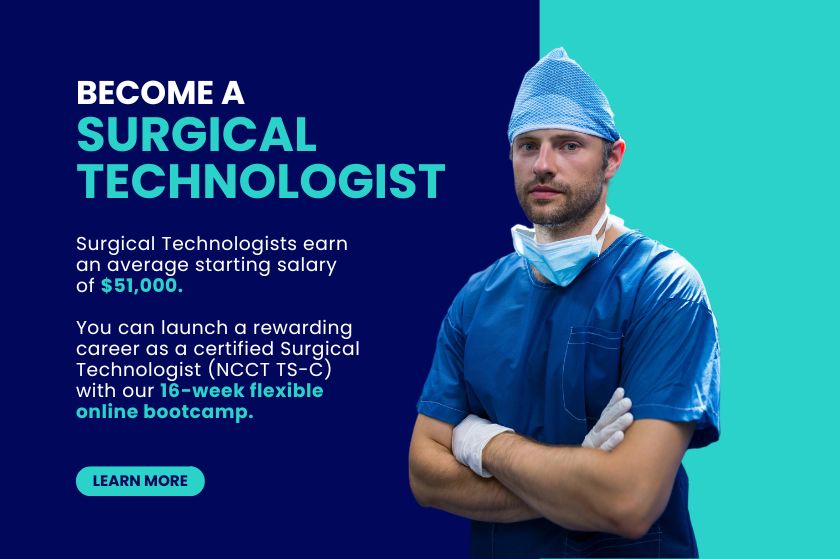Embarking on a career as a surgical technologist is a rewarding journey filled with opportunities for growth and advancement. Surgical technologists play a crucial role in the operating room, assisting surgeons and ensuring that surgeries proceed smoothly. However, like any profession, there are steps you can take to advance your career and take it to new heights. In this article, we will explore five ways through which surgical technologists can propel their careers forward.
Continuous Education and Certification
One of the primary ways to advance as a surgical technologist is through continuous education and certification. As medical techniques and technologies evolve, staying up-to-date with the latest advancements is crucial. Pursuing additional certifications and attending workshops can enhance your skills and knowledge, making you a valuable asset in the surgical team.
One avenue for professional growth is obtaining the Certified Surgical Technologist (CST) credential. This nationally recognized certification not only demonstrates your commitment to the field but also opens doors to higher-paying positions and specialized roles. Additionally, taking part in advanced courses in areas such as minimally invasive surgery, robotic surgery, or specific surgical specialties can make you indispensable in complex surgical procedures.
Specialization in Surgical Specialties
Advancing your career as a surgical technologist can involve specializing in particular surgical areas. As you gain experience, you may find that you are drawn to a specific surgical specialty, such as orthopedics, neurology, or cardiovascular surgery. Specializing in a particular field allows you to develop expertise in procedures unique to that specialty, making you an indispensable team member for surgeons.
For instance, if you choose orthopedics, you will focus on procedures involving bones and joints. Learning about specialized equipment and techniques used in these surgeries will set you apart from general surgical technologists. By becoming an expert in a specific surgical area, you'll increase your earning potential and be in high demand among hospitals and surgical centers that require specialized skills.
Leadership and Supervisory Roles
Advancement in your surgical technologist career can also come through leadership and supervisory roles. As you accumulate experience, you might have the opportunity to take on responsibilities such as mentoring new surgical technologists, coordinating surgical teams, or even becoming a surgical technology department manager. These roles require strong organizational skills, effective communication, and the ability to manage a team effectively.
Becoming a leader not only adds value to your organization but also provides personal and professional growth. It allows you to influence the quality of patient care, contribute to process improvements, and shape the future of surgical technology practices within your institution.
Pursuing a Bachelor's Degree in Surgical Technology
While a certification and diploma can be enough to enter the field, pursuing a bachelor's degree in surgical technology can provide you with a distinct advantage in career advancement. Many institutions now offer bachelor's degree programs tailored to surgical technologists. These programs often delve deeper into topics such as anatomy, surgical pharmacology, and healthcare management, equipping you with a well-rounded education that goes beyond the basics.
A bachelor's degree not only enhances your technical skills but also positions you for roles with more responsibilities and potentially higher salaries. It can open doors to research opportunities, teaching positions, and administrative roles within the surgical technology field.
Networking and Professional Associations
Building a strong network and engaging with professional associations can significantly impact your career advancement. Joining organizations like the Association of Surgical Technologists (AST) can connect you with like-minded professionals, provide access to industry events, and offer opportunities for professional development.
Networking can also lead to job referrals, collaboration on research projects, and exposure to new trends and techniques. Attending conferences and workshops organized by these associations can broaden your horizons and introduce you to experts and leaders in the field.
Advancing your career as a surgical technologist is an exciting journey that involves continuous learning, specialization, leadership development, higher education, and networking. Embrace these strategies to rise through the ranks, enhance your earning potential, and contribute more effectively to the medical field.
What Skills Will Advance My Surgical Technologist Career?
In the dynamic field of surgical technology, honing and expanding your skills is a direct pathway to career advancement. As medical procedures become more sophisticated and patient care standards continue to evolve, possessing a diverse skill set becomes indispensable. Let's delve into how skills can propel your career as a surgical technologist forward.
Continuous Development
A surgical technologist's ability to adapt and learn new skills is paramount. The medical landscape is constantly evolving, with new surgical techniques and technologies emerging regularly. By actively seeking out opportunities to learn and improve, you position yourself as a valuable asset to any surgical team.
Skills such as mastering different types of surgical instruments, staying proficient in sterile techniques, and enhancing your knowledge of anatomy are all foundational. However, beyond these basics, consider branching out into specialized skills relevant to your chosen surgical specialties. For instance, if you're drawn to neurosurgery, acquiring skills related to brain and spinal surgeries can set you apart. If cardiovascular surgery is your interest, becoming proficient in handling advanced cardiac equipment can be your edge.
Adapting to New Technologies
Advancements in medical technology have revolutionized surgical procedures, making it imperative for surgical technologists to stay current with these innovations. Familiarity with robotic-assisted surgery, 3D imaging, and computer-assisted navigation systems can enhance your effectiveness in the operating room. By proactively seeking training in these technologies, you demonstrate your commitment to providing the best possible patient care.
Problem-Solving and Critical Thinking
Surgical technologists often encounter unexpected challenges during surgeries. Developing strong problem-solving and critical-thinking skills is essential for handling these situations with confidence and composure. The ability to quickly assess a situation, identify a solution, and communicate effectively with the surgical team is highly valued.
Moreover, displaying initiative by suggesting innovative solutions or contributing to process improvements showcases your dedication to patient safety and optimal outcomes. These skills not only make you an asset in the operating room but also position you for leadership roles where your expertise in decision-making is crucial.
Effective Communication
Clear and concise communication is the backbone of any successful surgical team. As a surgical technologist, you are a bridge between the surgical team and other healthcare professionals. Your ability to convey information accurately, especially during high-stress situations, ensures seamless coordination and enhances patient care.
Furthermore, strong communication skills extend beyond the operating room. Interacting with patients, their families, and hospital staff requires empathy, understanding, and effective explanation of procedures. By mastering interpersonal communication, you become a well-rounded professional who contributes positively to the overall healthcare experience.
Frequently Asked Questions and Answers
1. How can a surgical technologist advance their career?
A surgical technologist can advance their career through continuous education, earning additional certifications, specializing in specific surgical fields, pursuing leadership roles, obtaining a bachelor’s degree, and actively networking within professional associations. These steps help expand skills, increase earning potential, and open doors to advanced responsibilities.
2. Is certification important for surgical technologist career growth?
Yes, certification plays a key role in career advancement. Earning credentials such as the Certified Surgical Technologist (CST) demonstrates professional commitment, improves job prospects, and can lead to higher-paying and specialized roles within surgical teams.
3. What surgical specialties offer advancement opportunities for surgical technologists?
Surgical technologists can advance by specializing in areas such as orthopedics, neurology, cardiovascular surgery, minimally invasive surgery, or robotic-assisted procedures. Specialization allows technologists to develop in-demand expertise and become indispensable in complex surgical environments.
4. What skills help surgical technologists move into leadership roles?
Skills that support advancement into leadership roles include strong communication, problem-solving, critical thinking, adaptability to new technologies, and teamwork. These skills enable surgical technologists to mentor others, coordinate surgical teams, and contribute to improved patient care and operational efficiency.
Collaboration and Teamwork
Surgical procedures are intricate endeavors that require a high degree of teamwork and collaboration. A surgical technologist who can seamlessly integrate into the surgical team, anticipate the needs of surgeons, nurses, and anesthesiologists, and ensure a harmonious workflow is invaluable.
Cultivating a collaborative mindset and fostering positive relationships with colleagues not only enhances patient care but also opens doors for career growth. When you're known as a reliable and cooperative team player, you become a candidate for leadership roles that involve overseeing teams and orchestrating complex surgeries.
Health Tech Academy stands out as an industry leader in accelerated education for aspiring surgical technologists. Our Surgical Technologist program is designed to provide you with comprehensive hands-on training, cutting-edge knowledge, and the skills necessary to excel in the rapidly evolving field of surgical technology.




